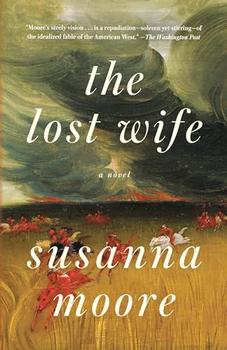Summary | Excerpt | Reviews | Beyond the book | Read-Alikes | Genres & Themes | Author Bio

A novel
by Susanna MooreFrom one of our most compelling and sensual writers comes a searing, immersive novel about a seminal and shameful moment in America's conquest of the West. Drawing partly from a true story, it brings to life a devastating Native American revolt and the woman caught in the middle of the conflict.
In the summer of 1855, Sarah Brinton abandons her husband and child to make the long and difficult journey from Rhode Island to Minnesota Territory, where she plans to reunite with a childhood friend. When she arrives at a small frontier post on the edge of the prairie without family or friends and with no prospect of work or money, she quickly remarries and has two children. Anticipating unease and hardship at the Indian Agency, where her husband Dr. John Brinton is the new resident physician, Sarah instead finds acceptance and kinship among the Sioux women at a nearby reservation.
The Sioux tribes, however, are wary of the white settlers and resent the rampant theft of their land. Promised payments by the federal government are never made, and starvation and disease soon begin to decimate their community. Tragically and inevitably, this leads to the Sioux Uprising of 1862. During the conflict, Sarah and her children are abducted by the Sioux, who protect her, but because she sympathizes with her captors, Sarah becomes an outcast to the white settlers. In the end, she is lost to both worlds.
Intimate and raw, The Lost Wife is a brilliantly subversive tale of the conquest of the American West.
Chapter One
I pretended to be asleep until Ank left the room. Florence was with Ank's sister Viola in Kingstown, and the house was quiet. When I could hear Ank in the shop, I jumped from bed and dressed, stuffing two books, a penknife, a dress, a salami, a moth–eaten tartan cape, and Maddie's letters into a cardboard suitcase. The letters are two years old, but I have read them so many times, I know every word by heart. She says there is work to be had in the West, not just saloon–girl work like in the penny weeklies, but work you wouldn't be ashamed to do. I wonder if she will be surprised to see me. Surprised to see I am alone. She never believed I would do it. I counted the money I'd saved, which came to forty–two dollars. I kept thirty dollars for myself, and wrapped the rest in a piece of butcher's paper, sealed it in an envelope, and addressed it.
When I heard Mr. Lombardi in the alley, I invited him into the kitchen for coffee. He delivers a supply of colored ...
Despite the book's small page count, Moore conveys ample information about settler mores in the mid-19th century. She also testifies to timeless phenomena: addiction, mental health issues and the cycles of misogynistic and racial violence. At heart, this is a story about survival, and about a mother desperately trying to protect her children and reconnect with the daughter she had to leave behind. The flat storytelling, which may represent a pastiche of period style, could limit reader engagement. Still, it is a vivid account of a lesser-known aspect of the country's war history, putting Indigenous people's suffering at the center. It is also a valuable critique of the American West, and what one character calls its "myth of innocence and abundance."..continued
Full Review
(858 words)
This review is available to non-members for a limited time. For full access,
become a member today.
(Reviewed by Rebecca Foster).
 Lucie Whitehouse, author of Before We Met
Her writing is so precise and perceptive, so disturbing, frightening and erotic all at once ... this profoundly clever woman with her life in her hands.
Lucie Whitehouse, author of Before We Met
Her writing is so precise and perceptive, so disturbing, frightening and erotic all at once ... this profoundly clever woman with her life in her hands. Much of Susanna Moore's The Lost Wife is set during the five-week conflict in Minnesota that came to be known as the U.S.-Dakota War. According to the University of Minnesota's Center for Holocaust and Genocide Studies, "The conflict can be viewed as one of the genocidal efforts to forcibly remove the Dakota from Minnesota."
Much of Susanna Moore's The Lost Wife is set during the five-week conflict in Minnesota that came to be known as the U.S.-Dakota War. According to the University of Minnesota's Center for Holocaust and Genocide Studies, "The conflict can be viewed as one of the genocidal efforts to forcibly remove the Dakota from Minnesota."
Starting in 1805, the Dakota signed a series of treaties with the U.S. government, ceding land in exchange for food and money. Minnesota was admitted to the Union in 1858, making it the 32nd state. U.S. government policy had incentivized migration to the West, culminating with the Homestead Act, which was signed into law in May 1862 and offered 160 acres to settlers who paid a small filing fee and were committed to ...
This "beyond the book" feature is available to non-members for a limited time. Join today for full access.

If you liked The Lost Wife, try these:

by Jane Smiley
Published 2023
From the beloved Pulitzer Prize-winning and best-selling author of A Thousand Acres: a rollicking murder mystery set in Gold Rush California, as two young prostitutes follow a trail of missing girls.

by Téa Obreht
Published 2020
The New York Times bestselling author of The Tiger's Wife returns with a stunning tale of perseverance - an epic journey across an unforgettable landscape of magic and myth.




Harvard is the storehouse of knowledge because the freshmen bring so much in and the graduates take so little out.
Click Here to find out who said this, as well as discovering other famous literary quotes!